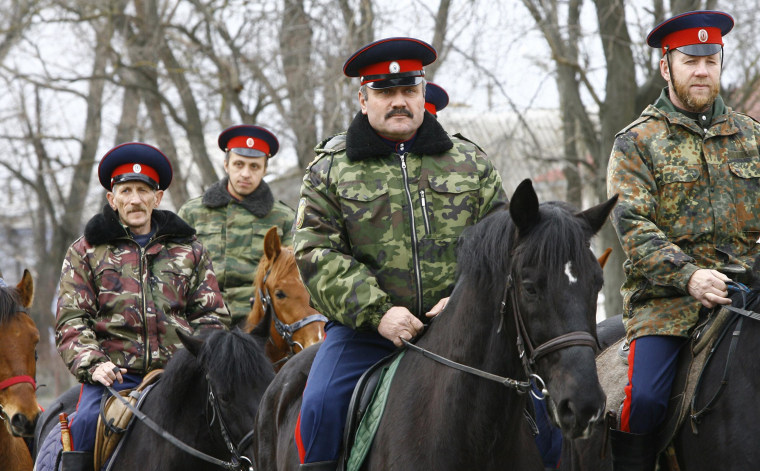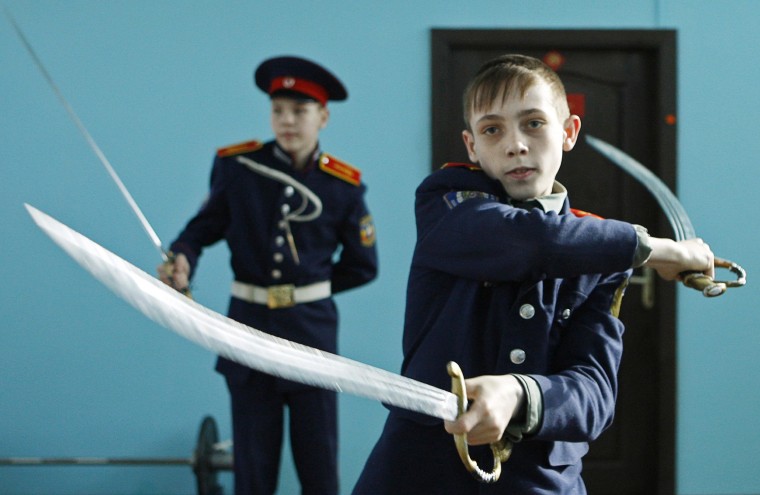A man heard cursing about “spies” aboard Malaysia Airlines Flight MH17 in a phone call allegedly intercepted just after the plane was shot down is the leader of a band of Russian Cossacks and may have been involved in the firing of the fatal missile, U.S. officials tell NBC News.
Technical analysis has confirmed that the voice heard on the audiotape obtained by Ukrainian authorities is that of Nikolai Ivanovich Kozitsyn, longtime leader of Russia’s Don Cossacks, according to the intelligence officials, who spoke on condition of anonymity. U.S. Secretary of State John Kerry also has vouched for the authenticity of the intercepted calls.
The officials cautioned that investigators are still uncertain who ordered the firing of the missile that destroyed the jetliner, killing all 298 people on board. They say the missile –- likely a Russian-made SA-11 Buk surface-to-air missile -– was launched from territory in eastern Ukraine controlled by pro-Russian separatists, a term that includes Ukrainians as well as Russian soldiers and nationalists, including the Cossacks. The latter are Slavic militaristic groups inspired by -- and in some cases descended from -- the fierce horsemen who battled to defend Czar Nicholas II against the Bolsheviks during the Russian Revolution.
Kozitsyn’s remarks on a phone call with an unidentified “militant” -– and other comments implicating “Cossacks” -- have heightened suspicions that he was involved in the shootdown of MH17, though the officials declined to describe him as a suspect. Suspicions also have been raised about other figures in the Ukrainian separatist movement, including Igor Strelkov, the self-declared defense minister of the breakaway Donetsk People’s Republic, who allegedly “boasted” on social media about shooting down a Ukrainian aircraft shortly after Flight 17 crashed– a post that was later deleted.
As translated from Russian by the International Business Times, the militant was giving Kozitsyn a situation report on the crash site in eastern Ukraine in the conversation captured by Ukrainian security services and made public to bolster Kiev’s assertion of Russian involvement in the shootdown.
“They say on TV it’s AN-26 transport plane, but they say it’s written Malaysia Airlines on the plane. What was it doing on Ukraine’s territory?” the militant asked.
Kozitsyn’s unapologetic response, “That means they were carrying spies. They shouldn’t be f----ing flying. There is a war going on.”
In another call released by the Ukrainian government, a pro-Russian separatist identified as “Major” described the crash scene for another separatist known as “Greek.” In the call, “Major,” who said he had visited the outer perimeter of the crash scene – “where the first bodies fell” – said, “These are Chernukhin folks who shot down the plane. From the Chernukhin checkpoint. Those Cossacks who are based in Chernukhino (a Ukrainian town midway between the rebel strongholds of Donetsk and Luhansk).” (Chernukhino is approximately 20 miles northwest of the Ukranian town of Snizhne, where an Associated Press reporter spotted a Buk missile battery shortly before Flight 17 was shot down.)
More than a month before the downing of the Malaysia Airlines jet, the Ukrainian government released a narrated videotape and transcripts in English that it said detailed intercepted phone conversations in which Kozitsyn ordered rebel military operations against Ukrainian outposts.
In one excerpt from that video, as translated by Ukrainian authorities, Kozitsyn tells an unidentified “terrorist” that the rebels should target an army fuel depot, saying “We need to make it disappear.”
In another call, he threatened recalcitrant rebel fighters, saying, “There are clashes in Sloviansk, people are dying! While the fights are in progress they hid there! I will vanish them all personally! Tell them that!” according to the transcripts. (NBC News has not confirmed the authenticity of the videotape or translation.)
Kozitsyn also was suspected of involvement in the kidnapping of nine observers from the Organization for Security and Cooperation in Europe (OSCE) in Ukraine, the German news magazine Der Spiegel reported last month. (The OSCE observers were later quietly released.) On July 12, the European Union added him to its list of individuals subject to financial sanctions as a result of the conflict in Ukraine.
An article in the Russian newspaper Novaya Gazeta published on May 12 reported that Kozitsyn had launched a recruiting campaign in the Russia’s Rostov region, seeking detachments of Cossacks to help the pro-Russian rebels in Ukraine.
It said Kozitsyn, the “ataman” (which literally translates as “father of horsemen”) had ordered “all Cossacks who have conscience to stand up to defend their brethren” against “Poles, Romanians and Hungarians” that he claimed fighting on behalf of the Ukrainian government.

Since the outbreak of hostilities between Ukraine and Russia in February, the Cossacks have emerged as key go-betweens for the Ukrainian separatists and Moscow, according to U.S. academic experts.
While the original Cossacks were freedom-loving frontiersmen akin to the American cowboy of the Old West, the modern version are members of religious-based community groups who identify with the storied Cossack history, said Matthew Rojansky, director of the Wilson Center’s Kennan Institute. While most are ethnic Slavs who live near the border with Ukraine, the groups accept members from other regions , he said.
“Normally it’s a kind of community organization where young Russians with a nationalist and religious orientation can go and participate in activities like you’d expect from the Boy Scouts – parades, fish fries, that sort of thing,” he said.

But members of the Cossack “hosts,” as the various groups are known, also have a militaristic side, embracing the historic “warrior identity,” Rojansky said.
Long persecuted during the communist Soviet Union era, both for their allegiance to the czars and their Russian Orthodox beliefs, the Cossacks have rebounded in recent years to play an active societal role, often acting as proxies for the Kremlin.
Among other activities, they have been enlisted in a sort of national neighborhood watch program, though one with a xenophobic reputation, said Jeff Mankoff, deputy director of the Center for Strategic and International Studies’ Russia and Eurasia Program.
“They’ve essentially been deputized as a kind of public order force in parts of southern Russia,” he said. “A lot of this has to do with ethnic tensions. … There is concern with migration and ‘southerners’ – which is to say people from the Caucuses – and they keep an eye out for people breaking laws or who are not in the country legally and then harass them and, in some cases, turn them over to the police. It’s sort of like the groups on the border in Texas.”
Follow NBC News Investigations on Twitter and Facebook.
Cossack groups also have a history of joining fights outside Russia’s borders if they perceive a conflict as threatening Russian-speaking peoples or ethnic Slavs, said Rojansky, noting that the Cossack involvement in Ukraine in some ways resembles the War of Transnitria, which broke out in 1990 when a Russian-speaking enclave on the border between Ukraine and Moldova sought to break away from the latter. Cossacks from Russia rushed to defend the separatists, who were ultimately defeated.
Ukraine also considers the Cossacks part of its national identity, and also has Cossack groups fighting on its behalf, according to both Rojansky and Mankoff.
“Some of them identify with Ukraine because they see that as the successor to the Cossack entities that existed in the past,” said Mankoff. “But others, like the Don Cossacks (who derive their name from a Russian river) identify with Russia because that’s when they were at their apogee, when they had a special status accorded to them. They identify with Russian greatness.”

